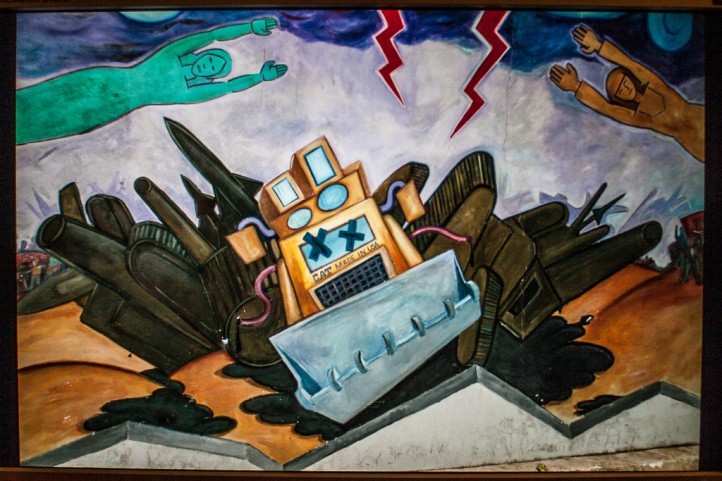

Since the 9/11 terrorist attacks in the USA and following wars in Afghanistan and Iraq, a number of books have been written to understand the phenomenon of terrorism, its causes and possible solution to this confrontation between the extremists using the name of religion and the West.
This book, How to win a cosmic war -- confronting radical Islam, authored by Reza Aslan, a teacher and researcher working at the University of California, is one such effort which digs deep into the question of radical religious movements and jihadi ideology and gives a panoramic view of conflict underway in Afghanistan, Lebanon, Palestine-Israel, Europe and America. Senior intellectual and political activist based in Lahore, Altaf Ahmed Qureshi, has translated the book in Urdu.
Reza Aslan’s thesis is that self-proclaimed jihadis, involved in terrorist activities are waging a struggle which they believe is a divine religious task. Hence he names it a ‘cosmic war,’ a terminology first introduced by social scientist Mark Juergensmeyer.
He says the 9/11 terrorists considered this conflict to be a war between the forces of darkness and the light; they were not fighting against imperialism but the eternal forces of evil. His viewpoint is that cosmic war transforms people into God’s soldiers who aim to win this conflict not with the help of cleverness or strategy but through the force of conviction or faith.
In a cosmic war, there is no middle way; it divides the world between ‘they’ and ‘us’, black and white. This uncompromising division makes the other people ‘non-humans’ which legitimises violence against them. This war is not fought for land or politics but for identity as in this vague world identity is considered to be at stake.
Reza argues with empirical data that in recent time religion has developed into a potent world force and the believers in some sort of religion make up two-thirds of the world’s population despite progress in social, technological and scientific realms.
Religion is seen not only as a set of beliefs and rituals but an issue of identity that overrides other identities associated with ethnicity, culture and nationalities.
The author delves deep into the basic concepts relating to the theme of the book such as nation, nation-state, secular nationalism, Islamism and jihadism. He believes that globalisation has weakened our allegiances with the state and secular nationalism and people are reverting back to their old identities of ethnicity and religion. In his opinion, it’s hard for a state to control these identities.
Reza Aslan defines Islamism as a mixture of religion with nationalism, which has nothing to do with Islam. He says that conflict between secular nationalist movements like Al-Fateh (Palestine) and Islamist Hamas is a phenomenon which is raging all over the world and in all religions. In his view, Islamist movements are not a threat to the peace of the world. According to him, the danger is posed by transnational jihadist movements which reject the concept of nation-state as a mirage and have sprung from not the traditional Islam but modernity.
Jihadism is cosmic conflict between believers and infidels and waging jihad is the prime duty of the believers under this doctrine.
Reza analyses the rise of Islamism and later jihadism in Egypt and their evolution and connection with Wahabi and Salafi faiths to illustrate his point. He gives a history of the Zionism and Palestinian issue to highlight its importance as a motivating factor behind Islamist and jihadist movements. He also goes into history to trace the roots of Christian-Muslim rift in the crusades in the Middle Ages, which he categorises as cosmic wars. The author also examines the Jew fundamentalists in today’s Israel and Evangelical Christians in USA and draws parallel between them and Muslim extremists. He elaborates with examples that the so-called war against terror was fought with a passion of a crusade and turned into a cosmic war.
The writer has discussed in detail the concepts of al-Qeada’s ideology tracing its roots to the thought of Ibne Taimyyah (1236 AD) and the evolution of Takfeeri thought. Ibne Taimayya’s revolutionary ideas about jihad emerged in the context of Mongol’s conquest of Baghdad, but later they were adopted by present-day jihadists (though ignoring their context).
Reza takes a detailed look at how widespread discrimination meted out to Muslims in Europe has led to a crisis of identity and is one of the reasons of popularity of jihadist creed in Europe, but he says, the American society is more inclusive and provides much more opportunities to Muslims than Europe. In his view, Europe needs to learn from America.
He concludes his book on a chapter that lists differences between Islamists (religious nationalists) and jihadists (international cosmic warriors) and advocates that Islamists can neutralise jihadists and should be given a chance as they were in Turkey.
Altaf Qureshi has translated the book on such a difficult, scholarly subject in easy-to-read language. One may differ with the thesis of Reza Aslan and his conclusions, as I believe Islamists cannot provide way-out at least in Pakistan because they have joined hands with jihadists for now, but one cannot deny the author’s scholarly grip over the subject and insight he provides into this tangle.